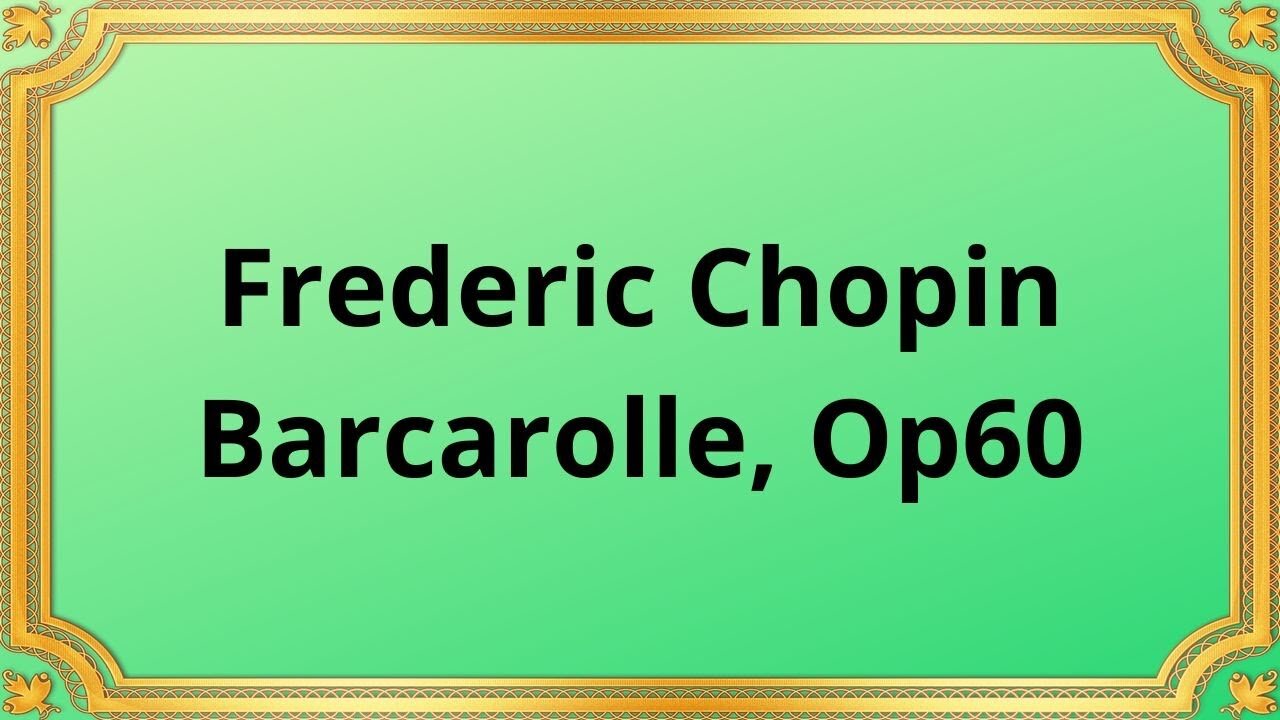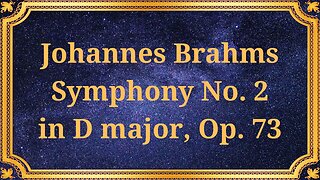Premium Only Content

Frederic Chopin Barcarolle, Op 60
#FredericChopin #Barcarolle #Op60 #classicalmusic #musicalcomposition #piano #music #composer #romanticmusic #musician #pianist
Publication date 1958
WALTER GIESEKING HERBERT VON KARAJAN
PHILHARMONIA ORCHESTRA
The world of classical music is adorned with timeless compositions that evoke a range of emotions.
Composed in 1846, Frederic Chopin's Barcarolle, Op 60 is a solo piano piece that embodies the essence of the romantic era. Chopin, a renowned Polish composer and pianist, drew inspiration from the Italian folk song tradition of "barcarolle," which originated from the gondoliers' songs in Venice. The fluidity and rhythmic sway of these songs were skillfully incorporated into this composition, resulting in a captivating and lyrical musical experience.
Barcarolle, Op 60 follows a ternary form, commonly known as ABA form. The piece begins with a serene and melancholic melody in A-flat major, portraying the gentle rocking of a boat on calm waters. The contrasting B section introduces a more dramatic and turbulent theme in the relative minor key of F-sharp major. This section mimics the stormy waves and intensifies the emotional journey of the listener. Finally, the A section returns, providing a sense of resolution and tranquility, as if the boat has found its way back to calm waters.
Chopin's Barcarolle, Op 60 showcases his ability to convey profound emotions through his music. The opening A section carries a sense of nostalgia and longing, evoking a bittersweet longing for a distant past or unattainable love. As the piece transitions to the B section, the listener is immersed in a whirlwind of emotions, experiencing the turbulence and intensity of life's struggles. However, the return of the A section offers solace and a glimpse of hope, leaving the listener with a serene and introspective feeling.
Performing Chopin's Barcarolle, Op 60 requires exceptional technical skill and artistic interpretation. The pianist must navigate the intricate passages, delicate ornamentation, and dynamic contrasts, all while maintaining the flow and expression of the piece. Each performer brings their unique interpretation, infusing the composition with their own emotions and musicality, making each rendition a personal and captivating experience.
Conclusion:
Frederic Chopin's Barcarolle, Op 60 stands as a testament to the composer's mastery of the piano and his ability to evoke deep emotions through music. Its enchanting melodies, contrasting dynamics, and evocative structure have captivated audiences for generations. As we immerse ourselves in its gentle sway and turbulent waves, we embark on a musical journey that stirs our souls and leaves an indelible mark on our hearts.
You have the opportunity to support the channel:
https://destream.net/live/RadSiarAl/donate
https://www.buymeacoffee.com/6355radsiaral
-
 36:10
36:10
Classical music_Music Inspiration
1 month agoJohannes Brahms Symphony No. 2 in D major, Op. 73
711 -
 4:42:20
4:42:20
FusedAegisTV
1 day ago$1000 Fortnite Tournament | 19 TEAMS!! #RumbleGaming
55.9K2 -
 10:39
10:39
NikkoOrtiz
2 days agoCooked TikTok Fails... Part 2
58.3K24 -
 13:47
13:47
GritsGG
12 hours agoClutching a Quad Dubular w/ Mr. Bobby Poff!
1.54K -
 15:58
15:58
BlabberingCollector
14 hours agoWorth It? Stenciled Edge Edition Of Harry Potter JUST RELEASED!
8501 -
 LIVE
LIVE
Lofi Girl
2 years agoSynthwave Radio 🌌 - beats to chill/game to
342 watching -
 3:55:20
3:55:20
Badlands Media
23 hours agoThe Narrative Ep. 29: Of Founders and Foundations
53.5K16 -
 20:29
20:29
Stephen Gardner
1 day ago🔥Trump OUTSMARTS Dems with 3 new moves | Whistleblower EXPOSES RFK removal plan!
39.6K353 -
 1:11:54
1:11:54
X22 Report
10 hours agoEp. 3680b - Bribes, Blackmail, Threats Deployed, Death Spiral, This Is The D’s Last Stand, Fear
197K285 -
 8:12:58
8:12:58
SpartakusLIVE
10 hours agoGames w/ @sophiesnazz || #1 SMOOTH Operator see SURGE in viewership after AESTHETIC reveal
75.9K1